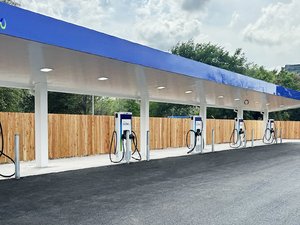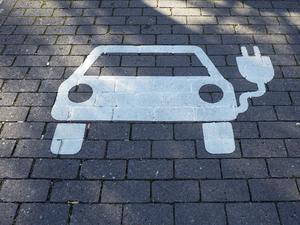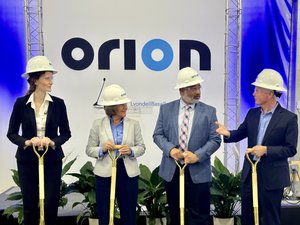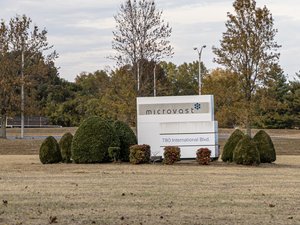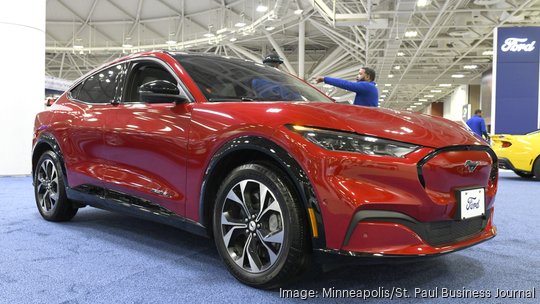
Last week, Ford Motor Co. (NYSE: F) became the latest automaker to commit to an electric vehicle goal by the end of the decade, promising hybrid drivetrains on every vehicle.
For a car-dependent city like Houston, that could result in more options, especially as electric vehicles continue to grow in market share in the United States and in Texas.
As of this week, Harris County has the most registered EVs in Texas, with over 38,000 registered, according to DFW Clean Cities. In the city of Houston, however, EVs make up 1.14% of the registered vehicles, behind 2.54% in Austin and 1.47% in Dallas Fort-Worth.
Compared to other cities around the world, the Houston area has a high ratio of battery electric vehicles, or BEVs, to plug-in hybrid vehicles, or PHEVs, according to local nonprofit Evolve Houston.
While data does not show a correlation between automaker announcements like Ford’s and customer demand, those announcements can’t be ignored either, said Casey Brown, Evolve Houston’s president and executive director.
“At Evolve, we do measure [hybrid electric vehicles] because our mission is to reduce greenhouse gases through the adoption of electric vehicles, and an HEV does represent an incremental gain,” Brown said.
Public commitments like Ford’s can increase customer awareness of EVs as an option, Brown said. He pointed to the manufacturer’s presence at the Houston Auto Show, where it showcased the battery-powered Ford F-150 models, as another example of a strategy that draws customer attention in Houston.
Meanwhile, Harish Krishnamoorthy, an associate professor at the University of Houston, said another driving factor for hybrids in Houston could be the price points for such vehicles, driven in turn by differing costs of batteries. Kelley Blue Book research published in February showed that the average price for fully electric vehicles in December 2023 was over $50,000, while the 2024 Toyota Prius hybrid was priced at $28,745.
“When you have a full EV, some of them have 70- to 80-kilowatt-hour battery banks — those things will cost a lot more than a typical hybrid, with a 1- to 2-kilowatt-hour battery, or even a plug-in with a 10- to 15-kilowatt-hour,” Krishnamoorthy said.
Growing economies around electric vehicle transition
One of the businesses that could boom with more EVs on the road in Houston is electric vehicle charging, and there are signs that major corporations have their fingers on the pulse.
BP Pulse Americas, a subsidiary of U.K.-based energy major BP PLC (NYSE: BP), opened its first large-scale U.S. charging site, branded as a Gigahub, at the BP America headquarters at 501 Westlake Park Blvd. in Houston. BP Pulse Americas CEO Sujay Sharma said the increase in EV options, including hybrids, made the decision easier.
“We’ll see a large number of new vehicles being released around 2025 to 2026 by [original equipment manufacturers], and more choices make [EVs] more attractive for consumers,” Sharma said.
Last year, the city of Houston's climate action plan led it to become the second city to partner with Florida-based Hertz for a rental EV rollout in the Bayou City. That plan also includes a data-sharing agreement between the parties to inform the placement of charging stations.
However, one piece that needs to be part of the discussion is a broader public charging network, Brown said. Such a network within Houston would also drive economic activity through job creation, he added.
“When you look at public charging infrastructure, that embryonic industry that's beginning to grow rapidly here, there’s a workforce that’s needed there,” Brown said.
A January report from the nonprofit think tank International Council on Clean Transport found that the total number of jobs to support charging infrastructure for all types of electric vehicles would need to hit 160,000 by 2032. Over half of those jobs would be in electrical installation, maintenance and repair.
Sign up here for the Houston Business Journal’s free morning and afternoon daily newsletters to receive the latest business news impacting greater Houston. For more business intelligence, follow us on LinkedIn, Facebook, X (formerly known as Twitter) and Instagram.
